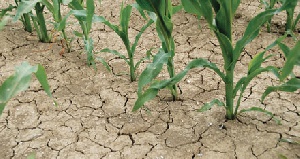 File photo: New seeds are being developed to resist harsh conditions
File photo: New seeds are being developed to resist harsh conditions
The Council for Scientific and Industrial Research – Savannah Agricultural Research Institute (CSIR-SARI) has developed new drought-tolerant seed varieties to improve food security in the country.
The new varieties to withstand all weather and ensure year-round agricultural production are to complement government’s Planting for Food and Jobs programme – for enhancing food security and job-creation as well achieving the Ghana Beyond aid initiative.
The new maize, rice, soybean, sorghum and groundnut drought-tolerant foundation seed varieties – tested and proven to increase yield of about 20 percent more than the existing varieties – have been produced in quantity and distributed to certified seed input dealers to be made available to farmers for their crop production.
Dr. Nicholas Ninju Denwar, a Senior Research Scientist at CSIR-SARI who disclosed this in an interview with the B&FT, said this will help bridge the gap between demand and supply.
He noted that the only way government’s programme can be sustained is through production of the drought tolerant seed varieties to supply farmers for their crop production throughout the year.
“In the Northern Ghana, rainfall is not adequate and nor is the distribution consistent. Though we may have enough rain, the distribution is not good – leading to drought during the raining or dry seasons; and sometimes the rain even ends earlier than it is supposed to, which does not allow the crops to grow well; hence the initiative of the research institute.” he said.
According to him, the drought-tolerant varieties are good for farmers in the savanna zone, and therefore they will collaborate with the Ministry of Food and Agriculture to produce more foundation seeds to feed farmers in the sector.
“We have adequate quality condition seeds for all the farmers, but it’s left with the seed producers to access and nurse them for the farmers,” he said.
SARI, he noted, since its inception has been producing foundation seeds for agricultural production in its operational areas to boost food and economic activities in order to curb poverty and unemployment rates.
He stressed that almost 80-90 percent of all varieties used by farmers are SARI-improved varieties that are accepted and adopted by the farmers.
He said due to government’s Planting for Food and Jobs programme, it has increased the number of farmers and that has also increased the demand; hence, the position of SARI is to increase its capacity for developing more certified and quality foundation seeds to feed the sector.
“One major problem we encounter is the inability of farmers to adopt good agronomic practices to maximise their crop yields; and, also, some are going in for uncertified seeds, thereby affecting their production,” he said.
He stressed that there is need for educational facilities to help produce all-year-round to meet demand.
To increase the foundation seed’s capacity to meet the high demand, Dr. Denwar said the institute is in the process of acquiring irrigation facilities or renting a land as an irrigation site to help produce more quality foundation seeds to meet the growing demand.
He also appealed for logistical and financial support to enhance its activities in feeding the agricultural sector with quality seeds.
CSIR – SARI is mandated to provide farmers in the Northern, Upper-East and Upper-West Regions with appropriate technologies to increase their food and fibre crop production, based on sustainable production systems which maintain and/or increase soil fertility.